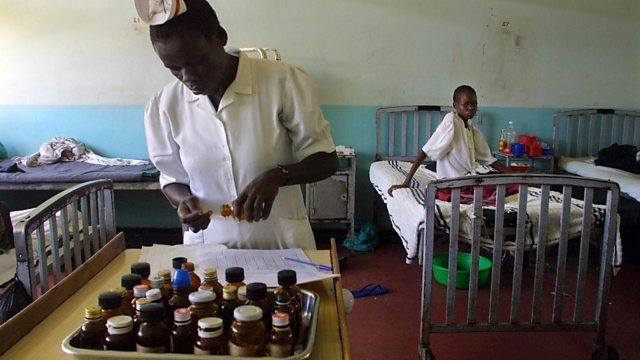New Shorter Treatment Offers Hope to TB Patients
A new, shorter treatment for drug-resistant tuberculosis tested in Uzbekistan offers hope to patients around the world.
Up until now the only treatment for drug-resistant strains of tuberculosis was a gruelling regime of up to twenty pills a day plus several big injections - for up to two years. And even then it was only effective in half the patients who endured it. But a shorter treatment lasting only nine months has been tried out in countries like Ethiopia, South Africa, Vietnam and Mongolia using a slightly different combination of antibiotics. Dr David Lister who’s the Co-ordinator of the short-term regimen for the charity MSF in Uzbekistan says it is effective in many more people than the previous option and has now been endorsed by the World Health Organization.
A call centre has been set up to help treat the mental health symptoms experienced by people exposed to violence in Colombia. Psychologists answer the phones in the centre in one of the country’s most dangerous cities – Buenaventura. Many of the victims of the gang-related violence don’t seek help because they regard what happens to them as a normal part of life. Others won’t visit mental health clinics because of stigma and shame. The charity Médecins Sans Frontières sends a car with loudspeakers into the poorest neighbourhoods to spread the word about the call centre clinic. One victim of sexual violence in the city is Gisela – who was infected with HIV when she was raped four years ago. She feels lonely and angry about what has happened to her. Alejandra Pereira is a psychologist who organised face-to-face sessions with Gisela to support her and provide her with tools to control her anger. Gisela feels she would have certainly killed herself if she hadn’t had the support provided by the call centre.
Women know they should give up smoking and eat healthily when they are pregnant. But what about exercise? Doctors used to advise that maintaining fitness was ok – but taking up exercise might not be a good idea. But a new review of research the impact of sport during pregnancy suggests that it’s the ideal time to take up exercise. So how much exercise is it safe to do?
Professor Kari Bo, who is the Principal of the Norwegian School of Sports Sciences, says it’s best to avoid some sports when pregnant – like scuba diving, ice hockey and downhill ski racing. But aerobics classes, cycling or running can help to reduce the risk of developing gestational diabetes and even conditions like pre-eclampsia, where the baby has to be delivered early.
Seventeen pregnant women have competed in the Olympic Games. So could the rest of us learn something from the elite athletes? Swedish athlete Eva Nystrom gave birth to a baby girl just two weeks ago and also has a five year old son. She was the World Champion in the long-distance duathlon twice – that’s a 10k run, followed by 150k on a bike and then another 30k run. The whole thing takes more than seven hours. She says that when she is pregnant and training she just listens to her body, to make sure she isn’t overdoing it.
(Photo: Medic measures out a dose of medicine in a hospital. Credit: Pedro Ugarte/AFP/Getty Images)
Last on
Broadcasts
- Wed 25 May 2016 21:32GMTÂ鶹ԼÅÄ World Service except East and Southern Africa & News Internet
- Thu 26 May 2016 01:32GMTÂ鶹ԼÅÄ World Service Americas and the Caribbean
- Thu 26 May 2016 02:32GMTÂ鶹ԼÅÄ World Service Online, Europe and the Middle East & UK DAB/Freeview only
- Thu 26 May 2016 03:32GMTÂ鶹ԼÅÄ World Service South Asia & East Asia only
- Thu 26 May 2016 04:32GMTÂ鶹ԼÅÄ World Service Australasia
- Thu 26 May 2016 06:32GMTÂ鶹ԼÅÄ World Service Europe and the Middle East & East and Southern Africa only
- Thu 26 May 2016 14:32GMTÂ鶹ԼÅÄ World Service except News Internet
- Sun 29 May 2016 19:32GMTÂ鶹ԼÅÄ World Service East and Southern Africa
Podcast
-
![]()
Health Check
Health issues and medical breakthroughs from around the world.


